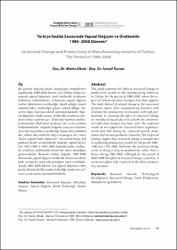| dc.contributor.author | Altıok, Metin | |
| dc.contributor.author | Tuncer, İsmail | |
| dc.date.accessioned | 2014-07-10T06:29:43Z | |
| dc.date.available | 2014-07-10T06:29:43Z | |
| dc.date.issued | 2013 | |
| dc.identifier.issn | 13030876 | |
| dc.identifier.uri | https://hdl.handle.net/11421/106 | |
| dc.description.abstract | Bu çalışma ihracata dayalı sanayileşme stratejilerinin uygulandığı 1980-2008 dönemi için Türkiye imalat sanayinde yapısal değişimin, emek üretkenlik artışlarına katkılarını irdelemektedir. Çalışmada yapısal değişim üretim faktörlerinin üretkenliğin düşük olduğu imalat sektörlerinden, üretkenliğin görece yüksek olduğu sektörlere doğru kayması olarak tanımlanmaktadır. Yapısal değişimin imalat sanayi üretkenlik artışlarına etkilerini ortaya koymak için “klasik pay kayması analizi” (conventional Shift-share analysis) adı verilen yöntem kullanılmaktadır. Ampirik bulgular sanayinin büyüme sürecinde kaynakların üretkenliği düşük olan sektörlerden yüksek olan sektörlere doğru kayacağını ileri süren “ekstra yapısal katkı hipotezine” (structural bonus hypothesis) destek vermemektedir. Bulgular yapısal değişimin 1981-1990 ve 1991-2000 dönemlerindeki üretkenlik artışlarını açıklamada önemli bir etken olmadığını göstermektedir. Bununla birlikte bulgular 1981-2000 döneminde yapısal değişim üretkenlik artışlarına ekstra katkı vermek bir yana yük getirdiğine işaret etmektedir. Ancak, 2003-2008 dönemi için yapısal değişimin etkisi pozitif olmakla birlikte emek üretkenliği artışlarının yalnızca yüzde üçünü açıklayabilmektedir. | en_US |
| dc.description.abstract | This study examines the effect of structural change on productivity growth in the manufacturing industries in Turkey, for the period of 1980-2008, where the export led industrialization strategies have been applied. The study defined structural change as the movement of factor inputs, from manufacturing branches with relatively low productivity to branches with high productivity. In assessing the effect of structural change on manufacturing productivity growth the conventional shift-share analysis has been used. The empirical results do not support the structural bonus hypothesis, which state that during the industrial growth, factor inputs shift to more productive branches. The empirical findings suggest that, structural change is unimportant in explaining productivity growth for the period 1981-1990 and 1991-2000. Moreover, the structural change seems to bring a drag on productivity rather than a bonus during 1981-2000. Although for the period of 2003-2008 the effect of structural change is positive, it seems to explain only 3 percent of the labor productivity increases. | en_US |
| dc.language.iso | tur | en_US |
| dc.publisher | Anadolu Üniversitesi | en_US |
| dc.rights | info:eu-repo/semantics/openAccess | en_US |
| dc.subject | Ekonomik Büyüme | en_US |
| dc.subject | Teknolojik Gelişme | en_US |
| dc.subject | Yapısal Değişim | en_US |
| dc.subject | Emek Üretkenliği | en_US |
| dc.subject | İmalat Sanayi | en_US |
| dc.subject | Economic Growth | en_US |
| dc.subject | Technological Development | en_US |
| dc.subject | Structural Change | en_US |
| dc.subject | Labor Productivity | en_US |
| dc.subject | Manufacturing Industry | en_US |
| dc.title | Türkiye İmalat Sanayinde Yapısal Değişim ve Üretkenlik: 1980–2008 Dönemi | en_US |
| dc.title.alternative | Structural Change and Productivity in Manufacturing Industry of Turkey: The Period of 1980-2008 | en_US |
| dc.type | article | en_US |
| dc.relation.journal | Anadolu Üniversitesi Sosyal Bilimler Dergisi | en_US |
| dc.relation.publicationcategory | Makale - Uluslararası Hakemli Dergi - Kategorisiz | en_US |


















